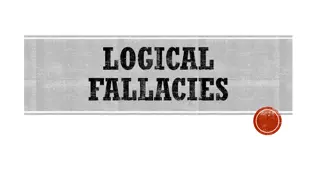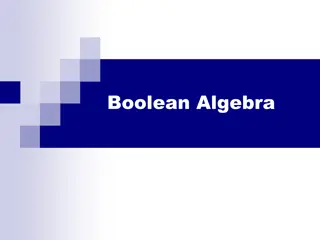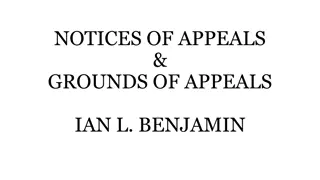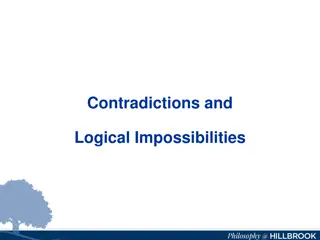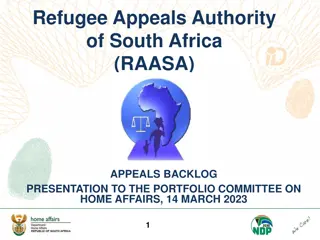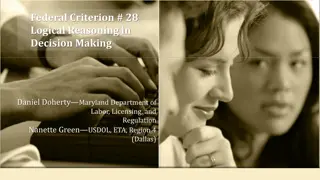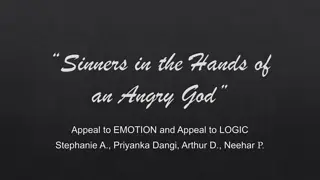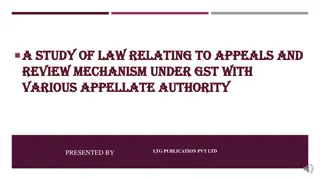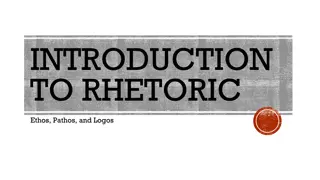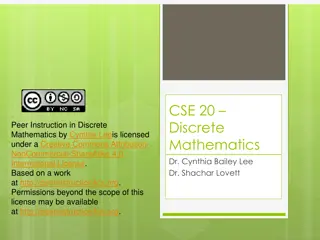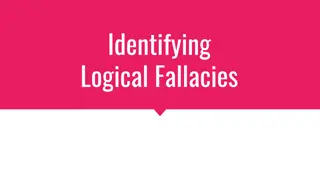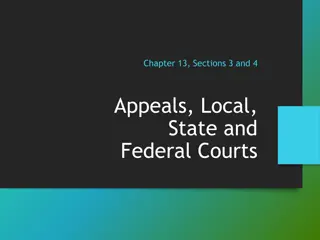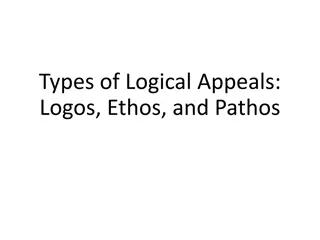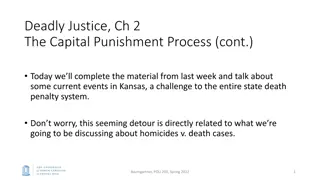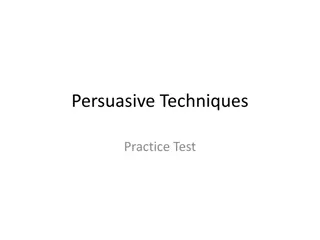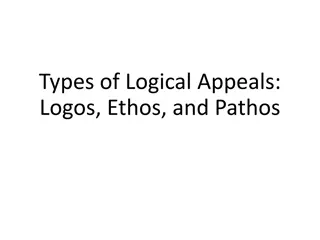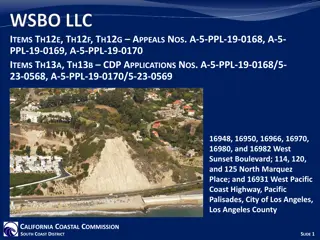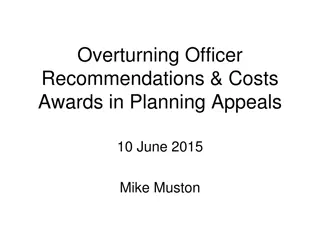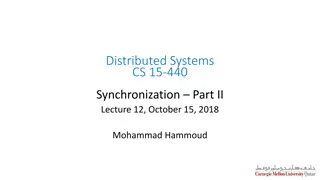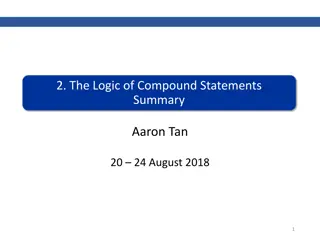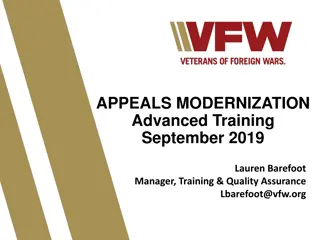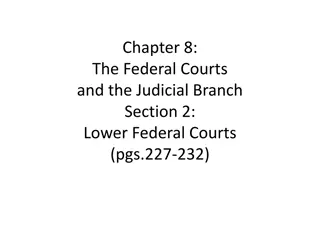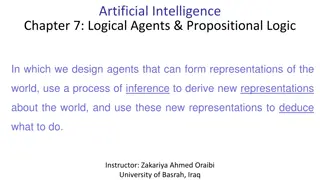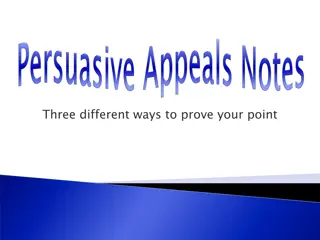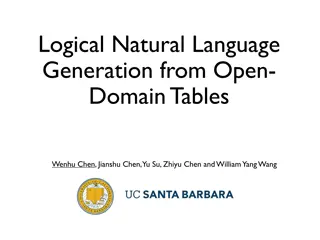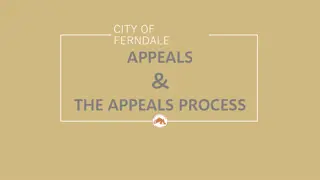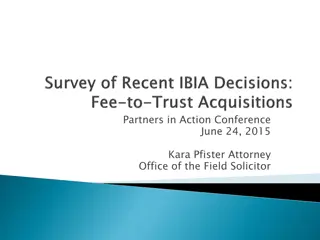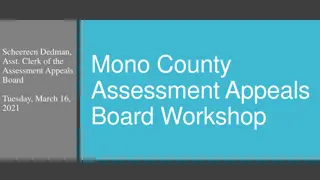Prior: Art. 66(b)(1): Appeals by Accused – A Court of Criminal Appeals shall have jurisdiction of a timely appeal from the judgment of a court -martial , entered into the record under section 860c of this title (article 60c), as follows:
The content outlines amendments introduced in the FY23 NDAA regarding appeals by accused individuals in court-martial cases and modifications to court-martial findings and sentences. It details the expansion of jurisdiction for Court of Criminal Appeals, the powers granted to the Judge Advocate Gene
2 views • 12 slides
Understanding Logical Form and Equivalence in Conditional Statements
Delve into the intricacies of logical form, equivalence, and compound statements in the realm of propositional logic. Explore valid and invalid arguments, conditional statements, and the logic of compound statements with puzzles to sharpen your logical reasoning skills. Unravel scenarios like determ
2 views • 81 slides
Identifying Logical Fallacies: Understanding Poor Reasoning
Logical fallacies are errors in reasoning that can occur in formal or informal arguments. Examples include appeals to authority, appeal to the majority, appeal to pity, and appeal to force. Understanding these fallacies can help in recognizing and avoiding flawed arguments.
0 views • 22 slides
Logical Expressions and Symbolism in Sentential Logic
Understanding sentential logic, logical expressions, and symbols through examples of logical reasoning and inference. Explore the concepts of logical OR, AND, negation, and the complexities of inclusive and exclusive logic in various scenarios.
1 views • 33 slides
Understanding Boolean Algebra and Logical Statements
Introduction to Boolean algebra, logical statements, and compound statements. Explore the concepts of Boolean variables, logical operators, writing conventions, equivalence in Boolean algebra, and truth tables. Learn how to analyze and evaluate logical expressions using truth tables.
1 views • 25 slides
Rights of Appeal in Legal Proceedings
This text discusses the statutory rights of appeal against decisions in legal proceedings, highlighting the importance of understanding the procedures and enactments that govern the appeals process. It specifically focuses on appealing decisions to the High Court related to various professional bodi
0 views • 60 slides
Addressing the Refugee Appeals Backlog in South Africa
The Refugee Appeals Authority of South Africa (RAASA) faces a backlog of appeals due to various reasons, including an influx of asylum seekers in 2009 and challenges with economic migrants. The introduction outlines the establishment and mandate of RAASA, highlighting efforts to address the backlog
0 views • 27 slides
Exploring Contradictions and Logical Impossibilities
Explore a series of paradoxes and logical puzzles, ranging from being in two places at once to time travel conundrums. Discover the concept of contradictions and logical impossibilities through thought-provoking scenarios and riddles. Dive into the realm of impossibilities and challenge your underst
1 views • 6 slides
Refugee Appeals Authority of South Africa (RAASA) Appeals Backlog Presentation
The Refugee Appeals Authority of South Africa (RAASA) presented progress on appeals backlog to the Portfolio Committee on Home Affairs in March 2023. RAASA, an independent statutory body, hears and determines appeals against decisions of Refugee Status Determination Officers. The presentation outlin
0 views • 31 slides
Enhancing Logical Reasoning in Decision Making Process
Federal Criterion #28 emphasizes the importance of stating logical reasons for decisions that align with findings of fact and conclusions of law. This criterion is key to ensuring fairness and accuracy in legal analysis. The scoring criteria, national appeals review results, and ways to improve scor
1 views • 8 slides
Emotional and Logical Appeal in 'Sinners in the Hands of an Angry God'
Exploring Jonathan Edwards' persuasive techniques through appeals to fear, hope, and logic in 'Sinners in the Hands of an Angry God'. This analysis delves into the emotional impact of imminent damnation, the comforting notion of salvation, and the rational arguments presented to sway the congregatio
0 views • 7 slides
Understanding Boolean Algebra and Logical Statements
Boolean Algebra allows for formalizing logical reasoning using variables that can be either true or false. It involves logical statements, compound expressions, logical operators like AND, OR, NOT, writing conventions, equivalence, and truth tables to determine the truth values of statements. By und
0 views • 25 slides
Update on UNHCR's Asylum Appeals Backlog Project in South Africa
The presentation by the UNHCR highlighted the background, successes, and challenges of the Asylum Appeals Backlog Project in South Africa. The project aims to eliminate the existing backlog of 153,000 appeals and prevent new backlogs, with a focus on digitization, research, and efficient decision-ma
0 views • 7 slides
Understanding Appeals and Review Mechanism under GST
Explore the appellate authorities involved in the GST appeal process, from the First Appellate Authority to the Supreme Court. Learn about the power of revisional authority, appeals to the High Court, and appeals to the Supreme Court. Discover the process by which aggrieved parties can seek redressa
1 views • 6 slides
Understanding Rhetoric: Ethos, Pathos, Logos
Rhetoric is the art of persuasive communication in various contexts. It involves utilizing ethos (credibility), pathos (emotions), and logos (logic) to influence the audience. Distinguishing between argument and persuasion, this communication form employs elements such as organization patterns, appe
4 views • 18 slides
Veterans Benefits Appeals and Legacy Appeals Process
Learn about the appeals process for denied VA benefits claims and the legacy appeals system for claims decided before February 19, 2019. Understand your rights to appeal decisions, examples of appealable decisions, actions that cannot be appealed, and the differences between Legacy Appeals and the A
3 views • 78 slides
Understanding Logical Connectives in Discrete Mathematics
Explore the world of propositional logic and truth tables in discrete mathematics through a peer-instruction approach. Learn about basic logical connectives, new connectives, complex formulas, operator precedence, and the nuances of implication (implies) with engaging examples. Delve into scenarios
0 views • 14 slides
Understanding Propositional Logic and Logical Operators
Learn about propositional logic, statements, logic operators, compound statements, exclusive-or, logical equivalence, and writing logical formulas for truth tables. Explore how to create compound statements for exclusive-or using different approaches and ensure logical equivalence. Enhance your know
0 views • 26 slides
Understanding Logical Relations in Programming Languages
Explore the concept of logical relations in programming languages, focusing on the relation between high-level and low-level programs. Learn about contextual equivalence, its benefits and limitations, and how logical relations offer a robust framework for defining program equivalence. Discover why l
0 views • 18 slides
Understanding Laws of Logic and Logical Reasoning
Laws of logic play a crucial role in reasoning and making deductions. This comprehensive guide explains the use of contrapositives, examples of conditional statements, and the significance of laws like the Law of Syllogism. Understanding these principles helps in effectively analyzing statements and
0 views • 8 slides
Introduction to Symbolic Logic: Understanding Logical Inferences
Logic is the study of reasoning methods to distinguish between correct and incorrect arguments. Symbolic Logic involves representing logic symbolically for easier understanding and manipulation. Logical inferences help in making decisions based on reasoning chains. The content discusses the use of l
1 views • 28 slides
Identifying Logical Fallacies in Sources: Presentation Assignment
Learn to identify logical fallacies in various sources by analyzing passages and applying the Logical Fallacy Referee tool. Work in pairs to select sources, identify fallacies, and present annotated examples to the class.
0 views • 7 slides
Exploring Appeals and Court Systems: Chapter 13 Overview
This educational content delves into the intricacies of appeals in the legal system, covering characteristics of successful appeals, procedures at appeals courts, the role of precedent, jurisdiction determination, and an overview of federal, state, and local court structures. The material also discu
0 views • 24 slides
Understanding the Three Types of Logical Appeals: Logos, Ethos, and Pathos
Explore the different types of logical appeals used in writing - Logos (appeals to reason), Ethos (appeals to values), and Pathos (appeals to emotions). Learn how to balance these appeals to create a persuasive argument and avoid overreliance on emotional manipulation.
0 views • 7 slides
Guide to Preparing Veterans for Hearings
This segment provides insights on preparing veterans for in-person hearings during the appeals process. It covers types of hearings, the role of Decision Review Officers (DRO) and Board of Veterans Appeals (BVA), and how to assist veterans in understanding the reasons for denial and choosing the rig
0 views • 12 slides
The Capital Punishment Process: Aggravators, Mitigators, and Post-Conviction Appeals
The continuation of the discussion on the capital punishment process, specifically focusing on the bifurcated trial, the consideration of aggravators and mitigators, post-conviction appeals including direct appeal and Habeas Corpus appeals, and the importance of proportionality review in state supre
0 views • 25 slides
Mastering Persuasive Techniques: Practice Test Insights
Explore the art of persuasion through practice test scenarios covering logical, ethical, and emotional appeals, with examples and explanations. Identify various persuasive techniques like logical appeals, ethical appeals, and appeal to loyalty, while also recognizing loaded language in persuasive me
0 views • 25 slides
Understanding Different Types of Logical Appeals: Logos, Ethos, and Pathos
Explore the realms of logical appeals - Logos, Ethos, and Pathos. Learn how to balance facts, values, and emotions in your writing to create compelling arguments. Uncover the significance of appealing to reason, ethics, and emotions in persuasive communication.
0 views • 9 slides
City of Los Angeles Development Project Appeals Overview
The content details appeals filed for development projects in Los Angeles, focusing on changes in development potential, project alternatives, tree removal concerns, and staff recommendations. It includes images and information on the project locations, city-approved developments, issues under appea
0 views • 16 slides
Understanding Costs Awards and Officer Recommendations in Planning Appeals
Explore the significance of material considerations and development plans in planning appeals, the implications of overturning officer recommendations, the different types of appeals, and the criteria for costs awards. Learn about the introduction of costs awards, behaviors that may lead to unnecess
0 views • 12 slides
Understanding Distributed System Synchronization and Logical Clocks
Continuing from the previous lecture on time synchronization, this session delved into logical clock synchronization, mutual exclusion, and election algorithms in distributed systems. Logical clocks, such as Lamport's Clock and Vector Clock, play a crucial role in defining the order of events withou
0 views • 33 slides
Understanding Compound Statements in Logic
The summary discusses the logic of compound statements, covering logical form, equivalence, tautologies, contradictions, conditional statements, valid and invalid arguments, and more. It explains the definitions of statements, negation, conjunction, disjunction, statement form, logical equivalence,
0 views • 12 slides
Veterans Appeals Modernization Overview
The Veterans Appeals Modernization Act of 2017 (AMA) aims to ensure fair and timely appeals decisions for veterans. The act introduces changes to streamline the appeals process, offer more options for veterans, and protect their rights. Key aspects include understanding changes created by AMA, ident
0 views • 58 slides
Understanding the Federal Court System in the United States
The Federal Court system in the United States comprises District Courts, handling a vast number of cases each year, with each district having multiple judges. These courts have jurisdiction over a range of cases, including civil rights violations, employment disputes, criminal offenses, and bankrupt
0 views • 11 slides
Understanding Logical Agents and Propositional Logic in AI
Designing logical agents involves forming representations of the world, using inference for deriving new insights, and deducing actions based on these representations. Knowledge Base (KB) is a crucial component, comprising known facts and current percepts to infer hidden states. Propositional logic,
0 views • 23 slides
Effective Persuasion Strategies: Logos, Pathos, and Ethos
Learn about three powerful ways to strengthen your arguments and make them more convincing: logical appeals (logos), emotional appeals (pathos), and ethical appeals (ethos). Discover how to use facts, statistics, expert opinions, loaded language, sensory details, and author credibility to appeal to
0 views • 9 slides
Advancements in Logical Natural Language Generation from Open-Domain Tables
Cutting-edge research in logical natural language generation (NLG) is transforming the field by moving beyond traditional surface realization to generate summarized text, conclude trends, and apply logical and mathematical operations. By addressing limitations such as lack of logical inference, summ
0 views • 33 slides
Understanding the Appeals Process in the City of Ferndale
Appeals play a crucial role in municipal decision-making, allowing parties to request a review of final decisions made by designated authorities. This process ensures that local decisions align with adopted laws and procedures, providing opportunities for aggrieved parties to challenge administrativ
0 views • 15 slides
Overview of Indian Board of Indian Appeals (IBIA) Decisions
The Indian Board of Indian Appeals (IBIA) exercises delegated authority from the Secretary of the Interior to provide independent review of decisions made by Bureau of Indian Affairs (BIA) officials. The IBIA consists of three administrative law judges and considers appeals on various issues such as
1 views • 38 slides
Understanding Assessment Appeals Process in Mono County
Explore the Assessment Appeals process in Mono County, including types of assessments, appeal deadlines, Board structure, and the appeal process. Learn how the Assessment Appeals Board functions, how to work with the Assessor's Office, and the statutory requirements for holding business meetings. Ga
0 views • 10 slides


